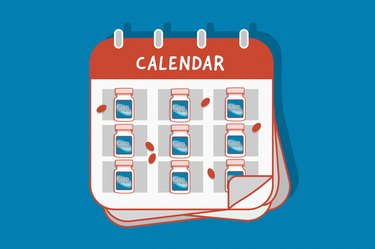
Stool softeners — aka, laxatives like Colace that draw water into the stool to make it softer and easier to pass — can help you have a bowel movement without straining.
They're generally meant to treat short-term constipation. But if you're relying on them regularly, you might wonder: Can you take stool softeners every day?
Video of the Day
Video of the Day
Here, Supriya Rao, MD, a gastroenterologist with Lowell General Hospital in Lowell, Massachusetts, explains whether stool softeners are safe long-term.
Tip
Stool softeners typically contain either docusate sodium or docusate calcium as the active ingredient, and they do not contain stimulant laxative ingredients like senna, sennosides or bisacodyl. Keep in mind that some over-the-counter laxatives are combination ("2-in-1") drugs that contain stool softeners and stimulant laxatives, which affect your body differently than a true stool softener.
The Long-Term Effects of Using Stool Softeners
First, some good news: Stool softeners aren't known to have harmful side effects, Dr. Rao says, even if you're taking them often. And you won't become dependent on stool softeners.
There are two important buts here, though:
1. You Might Be Ignoring an Underlying Health Issue
Over time, taking stimulant laxatives every day can make it harder to have unassisted bowel movements. That's not the case with stool softeners, Dr. Rao says.
"Some people take them indefinitely, and they're fairly safe," she says. "But if you're having continued constipation, the important thing is to find out what's causing it."
Consistent trouble going to the bathroom might be a sign of an underlying issue that isn't being managed, such as IBS, thyroid issues or pelvic floor dysfunction.
"We need to find out why the person is having a problem evacuating, since it can be so many things," Dr. Rao points out.
It might also mean you're just not eating enough fiber or drinking enough water — problems that are also worth addressing because they have other health consequences.
2. You Might Neglect Healthy Bowel Habits
If you're reliant on stool softeners, you may be less likely to pay attention to lifestyle habits that support your gut and healthy bowel movements, like eating fiber-rich foods and getting regular exercise.
That's important, because the state of your gut and microbiome can potentially affect the state of your overall health, according to the Cleveland Clinic.
How Often Should You Take a Stool Softener?
Stool softeners are meant to ease short-term bouts of constipation.
"It's something people use if they travel or if their bowel habits change a little bit," Dr. Rao says.
It generally takes between one and three days for a stool softener to take effect, and they're fine to use for up to a week at a time, per the National Institutes of Health.
But if you're still having hard, dry stools after using stool softeners for a week, you should let your doctor know.
When Should You Take a Stool Softener?
It's a good idea to take a stool softener before bed, recommends the Cleveland Clinic. The softener will have time to kick in while you sleep, increasing the chances of having a comfortable bowel movement in the morning.
Alternatives to Taking a Stool Softener
A mild case of constipation can often be managed with lifestyle changes. Make an effort to:
- Eat fiber-rich foods. Fiber makes your stool bulkier and easier to pass, but most of us fall short on getting the recommended 20 to 35 grams per day, per Harvard Health Publishing. Eating more fruits, vegetables, beans and whole grains can help you get your fill. "You can also take fiber supplements, but getting your fiber from food is better," says Dr. Rao.
- Limit processed foods and animal products. They're low in fiber and can lead to constipation if they make up the bulk of your diet, Dr. Rao says.
- Drink plenty of water. Liquids help make your stool softer. Eight to 10 glasses of water per day is the general recommendation, but your needs may be slightly different.
- Be active every day. You don't have to hit the gym or run a marathon. "Walking gets your gut moving," Dr. Rao says.
So, How Bad Is It Really to Take a Stool Softener Every Day?
Stool softeners themselves won't hurt you, even if you take them daily. But if you're relying on them to go to the bathroom all the time, it's worth investigating the possible underlying cause.
"If you're having a chronic problem for four to six weeks, it's time to let the doctor know. New changes in bowel habits could be a sign of something that needs to be investigated further," Dr. Rao says.
Was this article helpful?
150 Characters Max
0/150
Thank you for sharing!
Thank you for your feedback!
Is this an emergency? If you are experiencing serious medical symptoms, please see the National Library of Medicine’s list of signs you need emergency medical attention or call 911.



